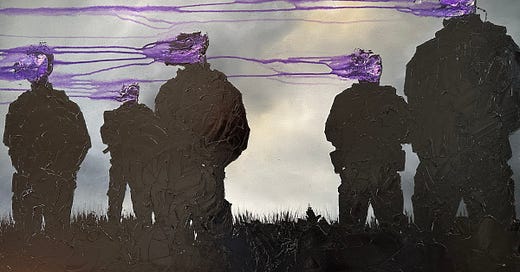How we show up in the world means more than the sum of everything we do.
The year I left the military, I agreed to a contract with myself. Nothing was written down or spoken out loud, but its terms were real and would cast a shadow in the years that followed.
This invisible “contract” contained rules which I felt necessary to fully accept my decision to separate.
Adhering to the contract would ensure who I was and my identity as a Navy SEAL would be maintained. It would protect me from slipping into what I viewed as complacency, normalcy, and returning to a time before the Navy when I had little idea who I was or what I wanted to do in life.
I knew that separation would inevitably leave gaps in my life; other guys had warned me about it, but this contract was a way to solve for that.
That first year, I found a non-profit to volunteer with, went to business school, and planned a half-dozen climbing trips for myself.
The goal was to leave the Navy, but for the person to stay the same.
I would go from one hard-to-get job to another, and I told myself what sense of connection I was forgoing with the community would be worth it due to the increase in connection I would inherit with family.
I operated this way for nearly two years, attempting to replace what I'd left behind in the teams.
In a pragmatic sense, it worked. I exchanged the title of "Navy SEAL" for other titles.
However, internally, it didn't work at all. I was no longer a SEAL, and I also wasn't the sum of the other titles I was pursuing. Titles that felt disparate, unfulfilling, and brought me little satisfaction.
What I was, was bored, apathetic, and unhappy.
Confused as to why I was unhappy and had trouble seeing the purpose in much of what I was involved in.
What I realized, and am still realizing years later, is that the source of my discontent had little to do with anything I was "doing", and really had nothing to do with having served in the military.
It was what happens when we try to answer the question of "who we are" with "what we do."
And before you ask, that’s it? That was the only problem?
It’s important to recognize how difficult it is to keep the two separate, especially for Vets. How rare it is that people are able to articulate “who they are” without mention of any external institution.
For most, that will require putting space between yourself and everything you've recently been working hard to become.
And to do that requires a healthy relationship with one’s own ego.
What I figured out was that the best place to start is by looking at all the ways we show up in the world.
The way we show up each day for our families, our coworkers, on vacation with our kids, and in our relationships with friends.
It’s likely that’s where we find evidence of who we really are—vice our status as executives, VP’s, Ironman finishers, or even Navy SEALs.
Those are jobs we do and things we achieve.
You may be reading this and think, when I pursue or accomplish A, B, and C, I do feel satisfied? I see no need to go through this exercise.
To which I would say what you already know, and that is that at some point in life, maybe not tomorrow, it's likely life will force you to complete the exercise, to think about these questions.
Who are you in the absence of what you do? How do you show up for your friends and family?
We see this all the time when pro-athletes face a career-ending injury, when the Olympics are over and Michael Phelps no longer has to go to swim practice, when Tiger Woods breaks his back, when people retire or get laid off, or when someone is wounded in combat and can no longer do the job they planned on doing.
To close, there's nothing wrong with high-bar achievements and intense pursuits. What's important is that regardless of how prestigious or challenging a pursuit may be, we want to feel satisfied once we achieve it. The only way to do that is to show up in the world and understand who you are, regardless of what you do.
The art for this piece was created by Sarah Rossetti “Invader Girl” and can be found at





Ben, your writing is thought provoking and always causes me to reflect and act. If I could go back and change anything, I would not because it would change everything. But, every day can be Day One in realizing our purpose, worth and value. Legacies are those we leave behind - who will remember us long after we are gone? Not as an AF Vet, Technology Exec and Ironman, but as a husband, dad, grandparent, brother, uncle and friend.
I am dealing with two transitions (more correctly, transformations). One is my wife’s; the other is my own. Alzheimer’s has taken her from a high-achieving, beautiful, scholar of literature to a child-like old woman who can hardly put a sentence together. I have become (surprisingly) the person I should have been all my life. Our marriage has never been better.